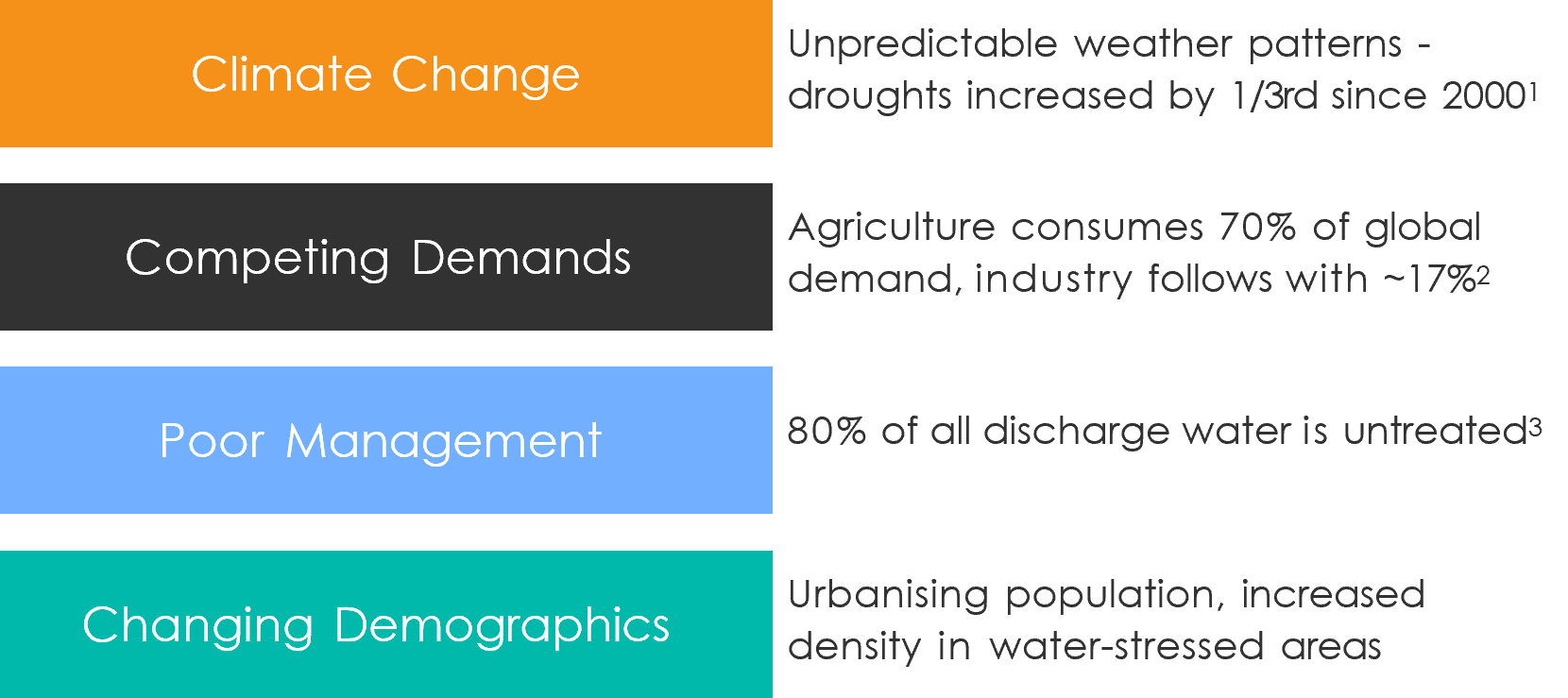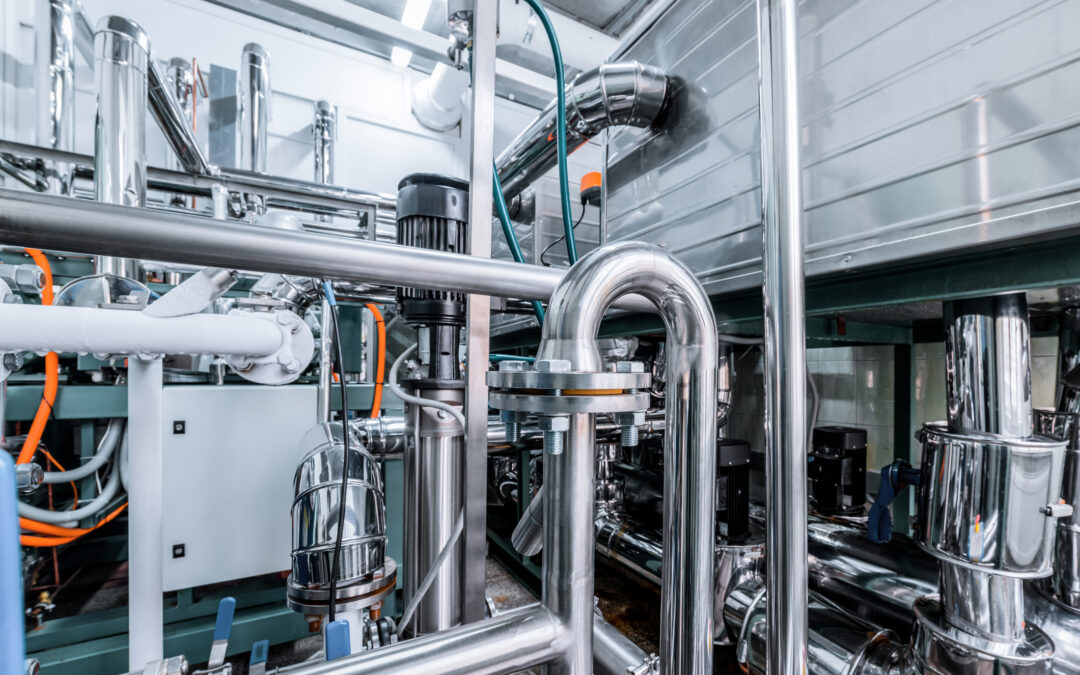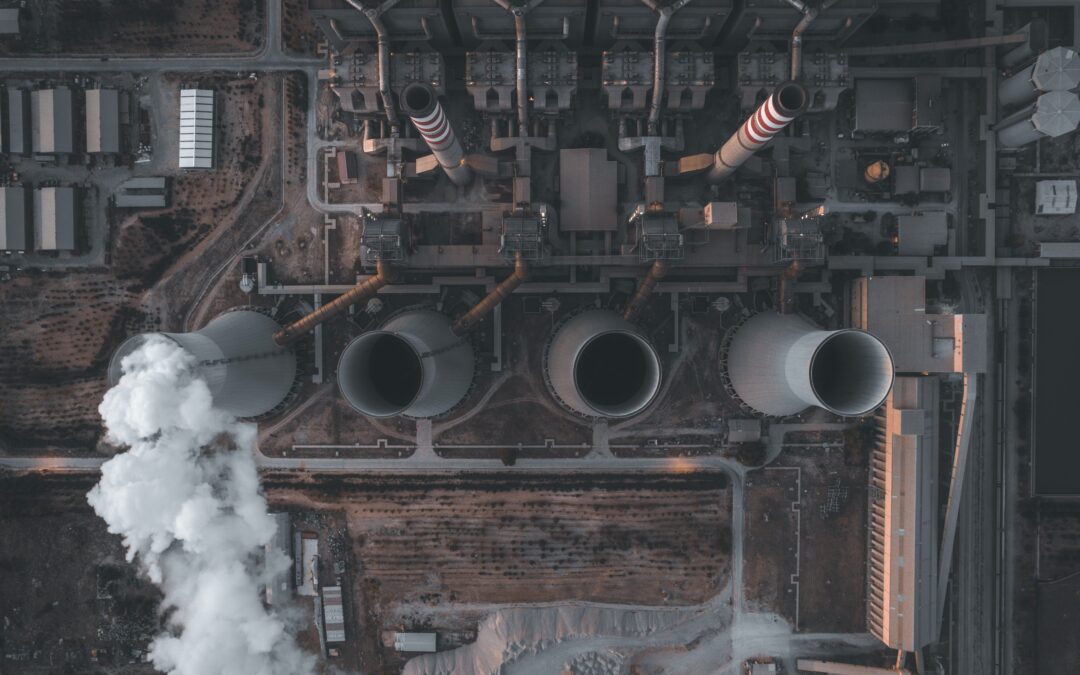Providing financed solutions to achieve corporate sustainability goals
Overview
- The demand for water and water-related energy is expected to double in the coming decades. Global drivers include demographic shifts, climate change, and increasing competition for water resources.
- Large corporations are having to invest in sustainable production, which includes improving water management and upholding global standards on water-related practices.
- The cost of water as an input is likely to increase; currently, water is often highly subsidised and its true economic value is not reflected in its price.
- Large consumer-facing companies are investing in water-efficient processes and sustainable water management, including treatment assets, smart irrigation, new technologies, and replenishing local water sources as pressure builds to keep them accountable to their internal sustainability targets.
- Many industrial players with polluting manufacturing processes lack the capacity to invest in and manage sustainability solutions – there is a growing market for outsourced financing and operations of co-located sustainability assets.
- Resonance has the relevant technical experience, a network of reliable developers/operators, and the financial means to provide packaged solutions to help industrial clients reduce their negative environmental impact.
An increasingly scarce resource
Pressure on water as a vital resource

Pressure on producers to take action
Legislative pressure – discharge restrictions and the threat of tightening policy and enforcement
Brand and reputation – consumers pushing for accountability and action on sustainability goals
Science-based targets – corporates are having to achieve metrics within pressured timeframes
Economic drivers
- Reduced wastewater discharge fees
- Reduced purchase costs
- Mitigating the high cost of stranding industrial assets
- Pre-emptive action to anticipate tightening regulation and their related costs
Achieving corporate sustainabilitiy targets
In 2021, Carbon Disclosure Project Worldwide reported $301bn assets at risk due to water availability issues.(4) Corporations are taking this issue very seriously. Many are implementing an active approach to achieving their internal sustainability goals to reduce risks, increase long-term profitability and protect their brand reputation.
Example: PepsiCo Addressing the Water Crisis
A three-pronged approach to water(5)
PepsiCo has taken action on its Net Water Positive Vision investing $2M to restore the Colorado River Basin and $5M in the Colorado River Basin Fund for water scarcity technology and infrastructure solution.
Agriculture: drip irrigation at all sites to improve water-use efficiency and reduce consumption by 50%(6)
Operations: adopting Alliance for Water Stewardship standards and best-inclass at all manufacturing facilities in high and low-risk watersheds(7)
Community: Providing 100 million people with safe access to water by investing $53m in safe water access and launching a WaterAid initiative in Sub-Saharan Africa(8)
Impacts(9)
ECONOMIC
Enhanced crop yields from improved efficiencies – the company reported rapid returns on investment
ENVIRONMENTAL
Drip irrigation reduced consumption by 50%. Anaerobic digesters provide 75% onsite energy at the Leicester site
SOCIAL
PepsiCo have achieved 2/3rd of their goal to provide safe water for 100 million people by 2030
INNOVATION
PepsiCo expects to save up to 60 million litres of water annually and aims to implement the technology in almost 30 high-water-risk areas
TARGET
Water use efficiency has improved by 22% since 2015 with 31 production facilities adopting AWS Standard in 2021
Resonance’s solution – outsourcing water, energy, other resources and waste
Companies investing in building onsite water treatment and reuse infrastructure are making significant progress. However, many industrial firms lack the operational bandwidth and the relevant expertise to act on their sustainability goals. Many developers/operators lack the finance to build sustainable infrastructure. Resonance offers an outsourced solution, providing finance and connecting industrial firms with established operators/developers to address energy, resource, and waste disposal needs, including solutions for improving water management.
By co-locating sustainable infrastructure on-site, corporates reduce the environmental impact of their manufacturing process and accelerate the transition towards sustainable production. Co-location provides industrial producers the following benefits:
- Savings on costs
- Reduced waste and related disposal fees
- Increased energy efficiency
Create opportunities for additional revenue streams Progress on sustainability metrics
Improved brand reputation Potential for a positive climate impact
Sources
Important Information
This material has been prepared by Resonance Asset Management Ltd (“Resonance”). Resonance Asset Management Limited is registered in England and Wales with Company Number 09028327 at 6- 16 Huntsworth Mews, London, NW1 6DD, UK and authorised and regulated by the UK Financial Conduct Authority – Firm Number 627897.
This document does not relate to any financial or investment product or service and does not constitute or form part of any offer to sell, or any solicitation of any offer to subscribe or interests and the information provided is intended to be general in nature only. This should not form the basis of, or be relied upon for the purpose of, any investment decision. This document is not available to retail investors as defined under local laws.
This document has been prepared without taking into account any person’s objectives, financial situation or needs. Any person receiving the information in this document should consider the appropriateness of the information, in light of their own objectives, financial situation or needs before acting.
This document is provided to you on the basis that it should not be relied upon for any purpose other than information and discussion. The document has not been independently verified. No reliance may be placed for any purpose on the document or its accuracy, fairness, correctness or completeness. Neither Resonance nor any of its related bodies corporates, associates and employees shall have any liability whatsoever (in negligence or otherwise) for any loss howsoever arising from any use of the document or otherwise in connection with the presentation.




